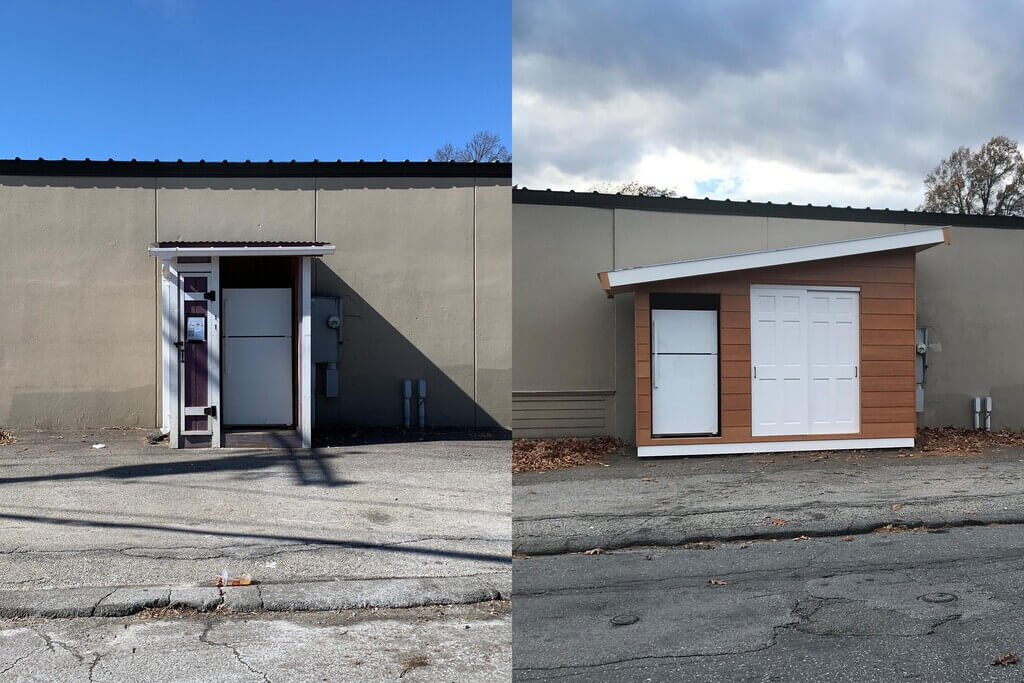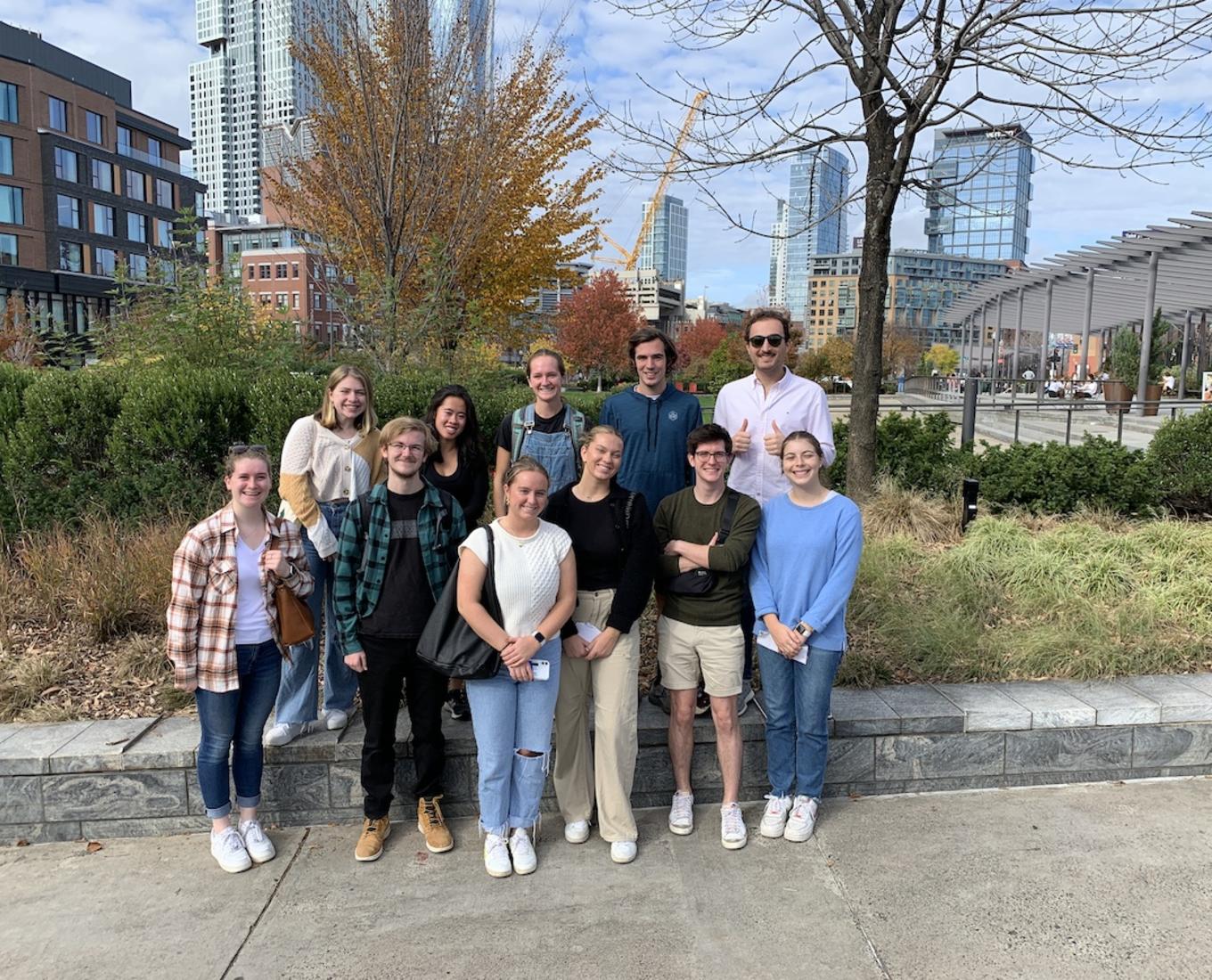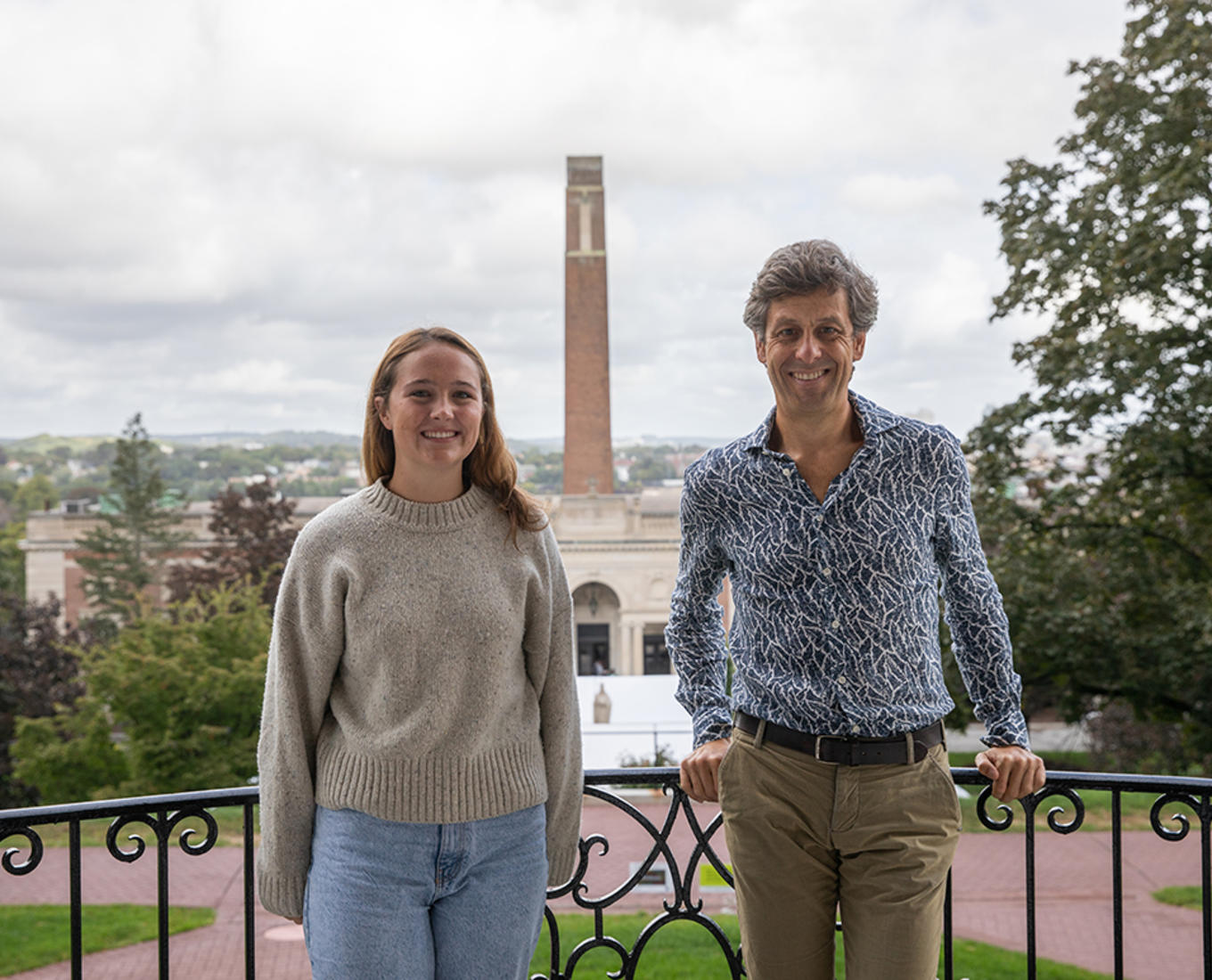In November 2024, patrons stopping by the community refrigerator located off Brooks Street in Worcester discovered a new enclosure for the outdoor appliance — a place in which fresh food and pantry staples are available 24-7 for anyone, following the motto: “Take what you need, leave what you can.”
The new structure featured an expanded pantry and a more protective, sloped roof thanks to a student design project led by Amy D. Finstein, associate professor of architectural and urban history; Larry Haley ’72, a Worcester architect and carpenter; and Woo Fridge, a mutual aid effort addressing food insecurity through a network of free food refrigerators across the city, including Brooks Street.
As part of Finstein’s spring 2024 community-based learning seminar course, The Modern Home, students redesigned the Brooks Street enclosure and developed design proposals for two new Woo Fridge sites. Haley, owner of Haley Design Building and a regular Woo Fridge volunteer, consulted with students during the process. He then recruited Nine Points Woodworking, a custom woodworking company in Worcester, to donate cabinetry and building services to ultimately construct the new design.
“As a mutual aid effort, our work is strengthened when neighbors across the city leverage their knowledge, skills and time towards maintaining this shared public infrastructure (the fridges),” said Woo Fridge organizer Julia R. Karpicz, who served as a project advisor for the course. “When the enclosure was first put up, neighbors who regularly help fill and clean that fridge commented on how beautiful the new enclosure is (and how much more food can fit in the pantry).”
DESIGN FOR OTHERS
Haley first connected with Finstein several years ago over their shared interest in the city and architecture. “Larry's career is this amazing patchwork of design, construction and community service — he greets everything excited and wondrous about what could come out of it,” Finstein said. Eventually, Haley pitched the Woo Fridge design challenge.
"My course explores philosophical and literal approaches to shelter, and in this case, housing a fridge provided an opportunity to consider both interpretations simultaneously,” Finstein said. “The task was simple: We must protect this fridge. But it also could provoke complex learning as we considered context, precedents, and potential design solutions."
Finstein folded the project into her course, alternating theoretical and historical discussions of shelter and housing with the hands-on task of designing outdoor refrigerator shelters. “It became a neat way of weaving together how an understanding of the past gives powerful points of reference for meaningful design interventions in the present,” she said.
Haley joined the last half of class every other week to share his expertise on the nuts and bolts of building and design, as well as his passion for the city, where he has contributed to countless projects, often in a service capacity.
“It’s the golden rule,” reflected Haley, who said he is fueled by his Holy Cross education “for others” and his Catholic upbringing. “The architectural profession, while making important contributions to public and civic life, is often about working for people of means. But the average person could also benefit from the services of a design professional, and it has been my real inclination to be drawn to service in that area.”
‘ARCHITECTURE, IN ITS FINEST STATE, IS COLLABORATION'
To create designs powered by multi-dimensional research, Finstein's students gathered data from GIS studies, considered factors like proximity to public transportation, neighborhood demographics, and protection from the elements, and conducted precedent studies of other urban refrigerators. “It's like detective work,” Haley explained.
At the end of the semester, students presented their designs to Woo Fridge and the College’s Donelan Office of Community-Based Learning, Teaching, and Engaged Scholarship. “Everyone was impressed with the quality of the final proposals and the detail that went into describing the neighborhoods and mapping out the sites and enclosure designs,” Karpicz shared.
Thanks to the new design, the Brooks Street fridge is now sheltered from direct sunlight, which protects its compressor from burnout. The roof pitch and overhang direct rain away from patrons and provide shade while also accommodating a solar panel, making it more sustainable for its site host, the Massachusetts League of Community Health Centers.
“Architecture, in its finest state, is collaboration,” Haley noted. “When you get people who have a lot of design acumen together and they are open to one another, you are going to come up with something elegant, and I feel we did that as a group.”
“This project challenged me academically but also left me to find ways to support the community that I had spent the past four years with,” shared Elizabeth Griffith ’24, a member of the Brooks Street student design team. “To find out my group contributed to this new development that will help the city fills me with pride and excitement as a recent Holy Cross graduate.”

Beyond the seminar course collaboration, the Holy Cross community has supported Woo Fridge in other ways since its beginnings four years ago. Through the College’s Student Programs for Urban Development organization (SPUD), students helped Haley build a Woo Fridge on Kansas Street. This semester, Government and Community Relations (GCR) student workers are spreading awareness on campus about the Woo Fridge mission and collecting donations for the College Square fridge on Southbridge Street. At the end of the semester, SPUD and GCR will encourage students to use their remaining dining dollars to purchase food items to donate.
“The ongoing engagement of Holy Cross students with the community fridges in their neighborhood is exciting to see,” Karpicz said. “Whether it is building, filling, and/or shopping at the fridges, every interaction between students and the fridges increases the resilience and connectedness of our community.”

